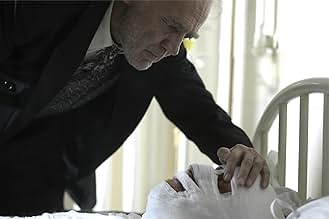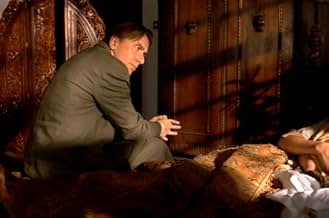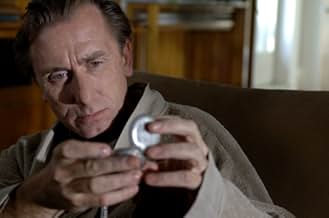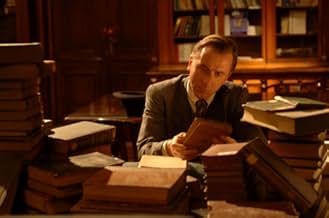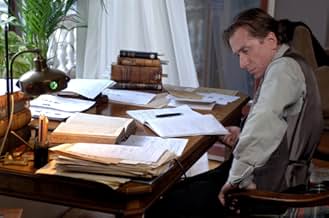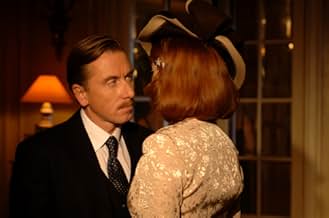NOTE IMDb
6,1/10
15 k
MA NOTE
Une histoire d'amour entourée de mystère. En Europe pendant la Seconde Guerre mondiale, un professeur est métamorphosé par un évènement cataclysmique et explore les mystères de la vie.Une histoire d'amour entourée de mystère. En Europe pendant la Seconde Guerre mondiale, un professeur est métamorphosé par un évènement cataclysmique et explore les mystères de la vie.Une histoire d'amour entourée de mystère. En Europe pendant la Seconde Guerre mondiale, un professeur est métamorphosé par un évènement cataclysmique et explore les mystères de la vie.
- Réalisation
- Scénario
- Casting principal
- Récompenses
- 1 victoire et 1 nomination au total
Dan Astileanu
- Professor
- (as Dan Astilean)
Avis à la une
First of all, i want to express my disgust for people who bash the movie because they didn't enjoy it, or didn't "get it". I accept other people's opinions, it is a free world (most of it anyway), but please stick to just stating your opinion, don't try to change how other people feel about it.
So, in my opinion, first and foremost, if you expect a movie that has drama or action that keeps you glued to your seat, this isn't for you. The plot of the movie has nothing to do with sci-fi, war time action or drama. It is a deeply philosophical movie that appeals to the reality matrix of people, trying to immerse you into some kind of a trance, where you begin to think like the author of the book, and the main character. If you are open minded enough, or a more than average philosophical person, this movie will be quite an experience for you. I know that for me, it was.
I liked it a lot mainly because of the dream/monologue scenes, because they somehow capture the essence of human thought. The doubt, the inner contradictions, the good and the bad sides of the same person. Things that most or all of us do, maybe not in a such out-of-body experience, but it does happen.
I don't want to give to much away, because half of the movie's effect on you has to do with the fact that it catches you off-guard.
So, in my opinion, first and foremost, if you expect a movie that has drama or action that keeps you glued to your seat, this isn't for you. The plot of the movie has nothing to do with sci-fi, war time action or drama. It is a deeply philosophical movie that appeals to the reality matrix of people, trying to immerse you into some kind of a trance, where you begin to think like the author of the book, and the main character. If you are open minded enough, or a more than average philosophical person, this movie will be quite an experience for you. I know that for me, it was.
I liked it a lot mainly because of the dream/monologue scenes, because they somehow capture the essence of human thought. The doubt, the inner contradictions, the good and the bad sides of the same person. Things that most or all of us do, maybe not in a such out-of-body experience, but it does happen.
I don't want to give to much away, because half of the movie's effect on you has to do with the fact that it catches you off-guard.
Francis Coppola's last mainstream Hollywood film was The Rainmaker and before that it was the critically maligned Jack. Since then the legend of cinema has walked away from being a director for hire. I guess he is still smarting from the failure of his Zoetrope Studios.
In Youth without Youth Coppola turns to European art cinema and not for the first time. His black and white Rumble Fish was heavily influenced by the German Expressionist style.
Tim Roth plays Dominic a 70 year old man in Pre World War 2 Romania, who is struck by lightning and is rejuvenated astounding his doctor (Bruno Ganz).
Dominic is 30 years younger with a regenerated body, he even grows new teeth, he undergoes various tests put to him by his doctors. However it is not only the physical body that has improved, also his mental faculties have gone through a quantum leap. This also arouses the interests of the Nazis once the war erupts.
Of course Dominic hides that he has an alter ego that converses with him and seems to have enhanced powers himself. Also whereas the older Dominic was striving to finish his life's work in the origins of linguistics, now he has the time to research and write further. He speaks many Oriental languages now he can read by just looking at a book.
As the war rages on Dominic escapes to Switzerland to continues his research. In the 1950s, a meeting with a woman called Veronica who reminds him of Laura, a lost love turns the film further on its head. Veronica transmigrates to another soul back in time such as an early disciple of Buddha in ancient India. She keeps going back further in time speaking in ancient languages enabling Dominic to get very near to the first spoken text but at the risk of losing Veronica for good.
The film is a mixture of vision and story. It could easily be something that could had been made by that other American filmmakers Terrence Malick or David Lynch. The film sets its stall out with the European Art-house cinema style, it is not a literal movie as the film feels dreamlike. You do wonder if this is all a dream of Dominic after being struck by lightning.
The film is little known but I was surprised by how accessible it was and how much I enjoyed the film. Coppola has never been afraid to experiment and at times he has misfired badly. Even here some of the scenes set in India does not convince as they are too modern with modern cars driving past. There is even a shot of The Taj Mahal Palace Hotel in Mumbai that crops up in scenes set in Uttar Pradesh.
However this is an intriguing, experimental even a slightly unnerving film. Roth should be given plaudits for drawing the viewer in and keeping them invested in his character.
Youth without Youth shows the world that Coppola is still a master filmmaker.
In Youth without Youth Coppola turns to European art cinema and not for the first time. His black and white Rumble Fish was heavily influenced by the German Expressionist style.
Tim Roth plays Dominic a 70 year old man in Pre World War 2 Romania, who is struck by lightning and is rejuvenated astounding his doctor (Bruno Ganz).
Dominic is 30 years younger with a regenerated body, he even grows new teeth, he undergoes various tests put to him by his doctors. However it is not only the physical body that has improved, also his mental faculties have gone through a quantum leap. This also arouses the interests of the Nazis once the war erupts.
Of course Dominic hides that he has an alter ego that converses with him and seems to have enhanced powers himself. Also whereas the older Dominic was striving to finish his life's work in the origins of linguistics, now he has the time to research and write further. He speaks many Oriental languages now he can read by just looking at a book.
As the war rages on Dominic escapes to Switzerland to continues his research. In the 1950s, a meeting with a woman called Veronica who reminds him of Laura, a lost love turns the film further on its head. Veronica transmigrates to another soul back in time such as an early disciple of Buddha in ancient India. She keeps going back further in time speaking in ancient languages enabling Dominic to get very near to the first spoken text but at the risk of losing Veronica for good.
The film is a mixture of vision and story. It could easily be something that could had been made by that other American filmmakers Terrence Malick or David Lynch. The film sets its stall out with the European Art-house cinema style, it is not a literal movie as the film feels dreamlike. You do wonder if this is all a dream of Dominic after being struck by lightning.
The film is little known but I was surprised by how accessible it was and how much I enjoyed the film. Coppola has never been afraid to experiment and at times he has misfired badly. Even here some of the scenes set in India does not convince as they are too modern with modern cars driving past. There is even a shot of The Taj Mahal Palace Hotel in Mumbai that crops up in scenes set in Uttar Pradesh.
However this is an intriguing, experimental even a slightly unnerving film. Roth should be given plaudits for drawing the viewer in and keeping them invested in his character.
Youth without Youth shows the world that Coppola is still a master filmmaker.
It was bound to happen that Youth Without Youth, the first film written and directed by Francis Ford Coppola in fifteen years (the first directed in ten), would be lauded by the critics for not being a real "comeback" kind of project. It's surreal, philosophical, mystical, and even has a mood about it that calls as a throwback to old romantic melodramas of the 40s and 50s (hence the opening titles). It's not even any kind of great film. It's pretentious in a few stretches, maybe more-so, and it takes a convoluted explanation that comes second in 2007 film only to Southland Tales for being more complex and bizarre. But unlike Kelly's film, Coppola at least has a hold on what he's doing, or what he's trying to accomplish. Coppola once said that art is all about taking riks, and to make films without risk is like sex without children.
In the grand scheme of things, at least with his career, Youth Without Youth seems to be slightly minor a risk when compared to the likes of Apocalypse Now or One From the Heart. But it's a risk that Coppola takes all the same, and through the intellectual thicket (which, contrary to some critics, isn't completely dense) there is some truly potent cinematic expression. So, the plot, the plot... A linguistics professor, Dominic (Tim Roth) is an old man when he gets struck by lightning in 1938, then proceeds to age back to 40 in recovery, only to then find that he's being watched- and planned for abduction- by Nazi scientists who want to use his newfound super-powers (mostly that he can, at times, harness powerful energy, as Dominic describes as "out of a science fiction novel"). This might be enough for a movie alone, but there's more- years later, a woman from Dominic's past (from before the lightning strike) appears again, also still apparently young, and she can talk in ancient languages, so then...
Yeah, I could go on with that. Suffice to say there's also talk about how this whole time-warp connects into the realm of consciousness itself, or what makes up knowledge or the pursuit of language, and all relating to time, leading up to an ending that flips around itself, all inspired by an old Chinese tale that goes around and around. What it means I still can't quite figure, and it at least shows Coppola won't spoon-feed any kind of easy ending (even the whole "it's only a dream" concept has some holes to fill, leaving ambiguity as something a little more logical). Frankly, I've never read any of the Mircea Eliade's writings, but there's a lot to it that strikes up references to other works. I couldn't help but think the plot, and its themes, were as though Philip K. Dick was forced to make a melodrama- on his own terms- from an unpublished book. Or that there was a connection to the Fountain, or even Dr. Who or something else. The comparisons are endless.
But what remains, at the end of trying to figure out what the hell Youth Without Youth will say as its ultimate message, is an original work, sincerely with the verve of a filmmaker who just says 'f*** it' and makes the movie he wants to make on his own terms (with, subsequently, his own money). If there is any risk to the project it's that Coppola gambles on narrative cohesion with elements like two Dominics following the lightning strike (one of which, of course, prods the other to complete his life's work as a "failure"), or the power of emotion with two people in love vs. the tremendous, daunting task of unlocking secrets of language and consciousness and what time even means. Couple this with technique that veers into the abstract, with upside down camera angles and upfront anti-Nazi imagery ala Indiana Jones, and a music that strikes up the most melancholy and precise of aforementioned melodrama, and it becomes the weirdest hybrid Coppola's ever made.
And yet, and yet, if Youth Without Youth is one thing above all else, it's, well... interesting. I never felt like getting up and even leaving to go to the bathroom much less leaving the film for good. I cared about Dominic and Veronica as I did the direction Coppola took the story (even if pretensions, particularly in the second half, seemed to loop into the equation). And Roth is, not to forget to mention, terrific in the role, seeming to understand where his character may (or may not) be headed as he continues with his research and finds that he is sort of doomed in time unless he goes down a certain path. He even gets to dig into a certain subdued humor underneath the skin of the picture, where a few times there's some laughs to be had at the expense of what's going on with Dominic, as though some old philosopher discovered a comic book and incorporated it into his character. It's a very strange movie experience, and not one I can easily recommend. But I do all the same, and Coppola fans will either like it or, as case is turning out, they wont.
In the grand scheme of things, at least with his career, Youth Without Youth seems to be slightly minor a risk when compared to the likes of Apocalypse Now or One From the Heart. But it's a risk that Coppola takes all the same, and through the intellectual thicket (which, contrary to some critics, isn't completely dense) there is some truly potent cinematic expression. So, the plot, the plot... A linguistics professor, Dominic (Tim Roth) is an old man when he gets struck by lightning in 1938, then proceeds to age back to 40 in recovery, only to then find that he's being watched- and planned for abduction- by Nazi scientists who want to use his newfound super-powers (mostly that he can, at times, harness powerful energy, as Dominic describes as "out of a science fiction novel"). This might be enough for a movie alone, but there's more- years later, a woman from Dominic's past (from before the lightning strike) appears again, also still apparently young, and she can talk in ancient languages, so then...
Yeah, I could go on with that. Suffice to say there's also talk about how this whole time-warp connects into the realm of consciousness itself, or what makes up knowledge or the pursuit of language, and all relating to time, leading up to an ending that flips around itself, all inspired by an old Chinese tale that goes around and around. What it means I still can't quite figure, and it at least shows Coppola won't spoon-feed any kind of easy ending (even the whole "it's only a dream" concept has some holes to fill, leaving ambiguity as something a little more logical). Frankly, I've never read any of the Mircea Eliade's writings, but there's a lot to it that strikes up references to other works. I couldn't help but think the plot, and its themes, were as though Philip K. Dick was forced to make a melodrama- on his own terms- from an unpublished book. Or that there was a connection to the Fountain, or even Dr. Who or something else. The comparisons are endless.
But what remains, at the end of trying to figure out what the hell Youth Without Youth will say as its ultimate message, is an original work, sincerely with the verve of a filmmaker who just says 'f*** it' and makes the movie he wants to make on his own terms (with, subsequently, his own money). If there is any risk to the project it's that Coppola gambles on narrative cohesion with elements like two Dominics following the lightning strike (one of which, of course, prods the other to complete his life's work as a "failure"), or the power of emotion with two people in love vs. the tremendous, daunting task of unlocking secrets of language and consciousness and what time even means. Couple this with technique that veers into the abstract, with upside down camera angles and upfront anti-Nazi imagery ala Indiana Jones, and a music that strikes up the most melancholy and precise of aforementioned melodrama, and it becomes the weirdest hybrid Coppola's ever made.
And yet, and yet, if Youth Without Youth is one thing above all else, it's, well... interesting. I never felt like getting up and even leaving to go to the bathroom much less leaving the film for good. I cared about Dominic and Veronica as I did the direction Coppola took the story (even if pretensions, particularly in the second half, seemed to loop into the equation). And Roth is, not to forget to mention, terrific in the role, seeming to understand where his character may (or may not) be headed as he continues with his research and finds that he is sort of doomed in time unless he goes down a certain path. He even gets to dig into a certain subdued humor underneath the skin of the picture, where a few times there's some laughs to be had at the expense of what's going on with Dominic, as though some old philosopher discovered a comic book and incorporated it into his character. It's a very strange movie experience, and not one I can easily recommend. But I do all the same, and Coppola fans will either like it or, as case is turning out, they wont.
A complex and challenging film, from one of the great American directors, and part of the continuing magical adventures of Tim Roth(The Legend Of 1900), this time around Roth is a linguistics professor trying to develop a theory of the origins of hum...(read more)an language and consciousness at his 70th birthday when he is struck by lightening that reverts him to his youth. Not only is he younger, but he discovers he can read whole books in minutes, see into dreams, and in the films most outlandish moments some limited telekinesis(but in all fairness it's his only way to stop an evil Nazi scientist who wants to jump start human evolution through electro shock). From there our hero meets a women who resembles one he used to know, who is similarly struck by lightening or near lightening which causes her to regress into previous lives. Naturally the two fall in love, and the odd couple are happy enough until her ancient language fits, get more frequent, and dive further and further into primitive languages, much to Roth's joy, though his love ages more and more with each regression.
Like I said Youth Without Youth is an ambitious mix of science fiction, world war 2 spy espionage, romance, meditation on death, aging, linguistics, the origins of consciousness, time, philosophy, the atomic bomb, multiple personalities, and reincarnation.
Watching Youth Without Youth is a bit like reading an overwrought but well written novel, where you can appreciate the skill of the speaker's use of language more than any profound statement being made. Not that Coppola's subjects are not profound, or treated, so, just that's it's done in such a way that at first view it's going to go over just about everyone's head. Author Mircea Eliade, is better known as a religious historian and academic, whose work is as rigorous as his fiction offerings. This is a well made and well performed film, but it's zeal gets ahead of itself on more than one occasion.
Like I said Youth Without Youth is an ambitious mix of science fiction, world war 2 spy espionage, romance, meditation on death, aging, linguistics, the origins of consciousness, time, philosophy, the atomic bomb, multiple personalities, and reincarnation.
Watching Youth Without Youth is a bit like reading an overwrought but well written novel, where you can appreciate the skill of the speaker's use of language more than any profound statement being made. Not that Coppola's subjects are not profound, or treated, so, just that's it's done in such a way that at first view it's going to go over just about everyone's head. Author Mircea Eliade, is better known as a religious historian and academic, whose work is as rigorous as his fiction offerings. This is a well made and well performed film, but it's zeal gets ahead of itself on more than one occasion.
This is definitely not everyone's cup of tea and has a pretty good chance of becoming a cult film. It explores major philosophic subjects from a dialectic angle, which might confuse pedestrians. In a nutshell: an elderly professor is challenged by his inability to complete his life's work. He is struck by lightning and gets the opportunity to observe life from a meta-human POV. He realizes that intellect, love , morals and reality in general are always ambiguous. IMO one must have some intellectual baggage, life experience and artistic curiosity in order to appreciate the profoundness of this film. Artistically, the film is very stylized and has a rather cold feel to it, something that might deter and alienate the viewer from actually empathizing with any of the characters. However, it's quite clever and stays with you after watching it. I would say that it felt to me a bit like a Darren Aronofsky film combined with Greenaway's Tulse Luper.
Le saviez-vous
- AnecdotesLanguages spoken in the film are English, French, Italian, Mandarin, German, Russian, Latin, Armenian, Sanskrit, Egyptian (not Arabic), Babylonian and a little Romanian. The ancient Sanskrit, Egyptian and Babylonian are authentic, researched in ancient texts and manuscripts by a team of expert linguists. The film also includes an artificial, "made-up" language, done with such integrity that it could provide the rudimentary basis of a new language.
- GaffesThe panoramic x ray shown when the teeth of the main character start to change is obviously from a 12 years old person as are clearly visible temporal molars (that are not present in adults) and their adult successors.
- Bandes originalesMiddle Village
Written by Lev Zhurbin (as Lev 'Ljova' Zhurbin)
Performed by Lev Zhurbin (as Lev 'Ljova' Zhurbin) on viola and Balogh, Kálmán (cymbalom)
Meilleurs choix
Connectez-vous pour évaluer et suivre la liste de favoris afin de recevoir des recommandations personnalisées
Détails
- Date de sortie
- Pays d’origine
- Site officiel
- Langues
- Aussi connu sous le nom de
- Youth Without Youth
- Lieux de tournage
- Sociétés de production
- Voir plus de crédits d'entreprise sur IMDbPro
Box-office
- Budget
- 5 000 000 $US (estimé)
- Montant brut aux États-Unis et au Canada
- 244 397 $US
- Week-end de sortie aux États-Unis et au Canada
- 28 550 $US
- 16 déc. 2007
- Montant brut mondial
- 2 624 759 $US
- Durée2 heures 4 minutes
- Couleur
- Mixage
- Rapport de forme
- 2.35 : 1
Contribuer à cette page
Suggérer une modification ou ajouter du contenu manquant

Lacune principale
By what name was L'homme sans âge (2007) officially released in Canada in French?
Répondre






